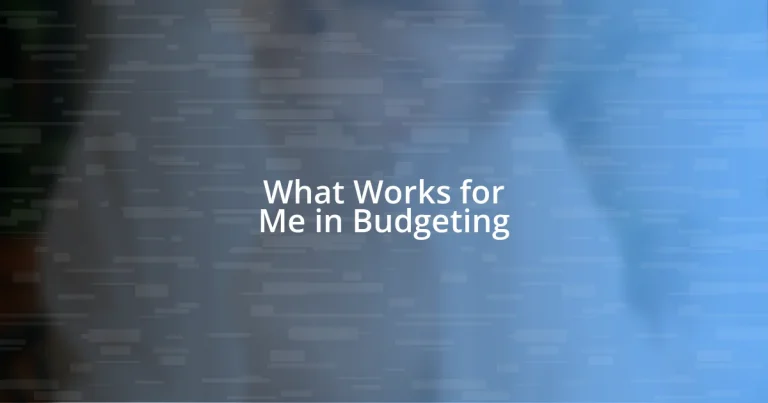Key takeaways:
- Utilizing budgeting techniques like zero-based budgeting and the 50/30/20 rule helps identify spending patterns and prioritize financial goals.
- Setting clear and specific financial goals, along with regularly reviewing and adjusting them, fosters accountability and adaptation to life’s changes.
- Staying committed to budgeting involves visualizing progress, sharing goals with others for support, and rewarding milestones to maintain motivation.
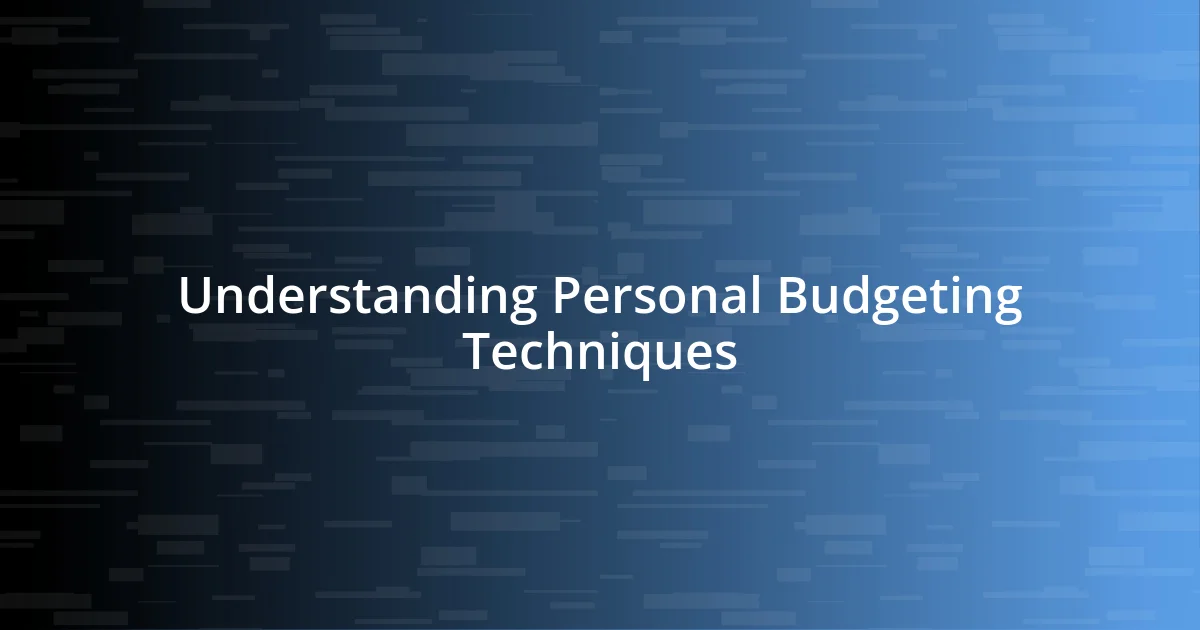
Understanding Personal Budgeting Techniques
Understanding your personal budgeting techniques is key to gaining control over your finances. For instance, when I first started tackling my budget, I experimented with the zero-based budgeting method. This approach requires assigning every dollar a job, which made me feel empowered and intentional about my spending.
I remember being surprised by how much unnecessary monthly subscriptions I had. It hit me that those tiny amounts really add up! Have you ever taken a hard look at your recurring expenses? Identifying where your money goes most can spark significant improvements in managing your budget.
Another valuable technique I’ve found is the 50/30/20 rule, which divides income into needs, wants, and savings. This method helped me realize that I was overspending on dining out. By adjusting my priorities, I not only saved money but also created more room for experiences that I truly valued, like traveling. It’s amazing how a small shift in perspective can impact your financial health, don’t you agree?
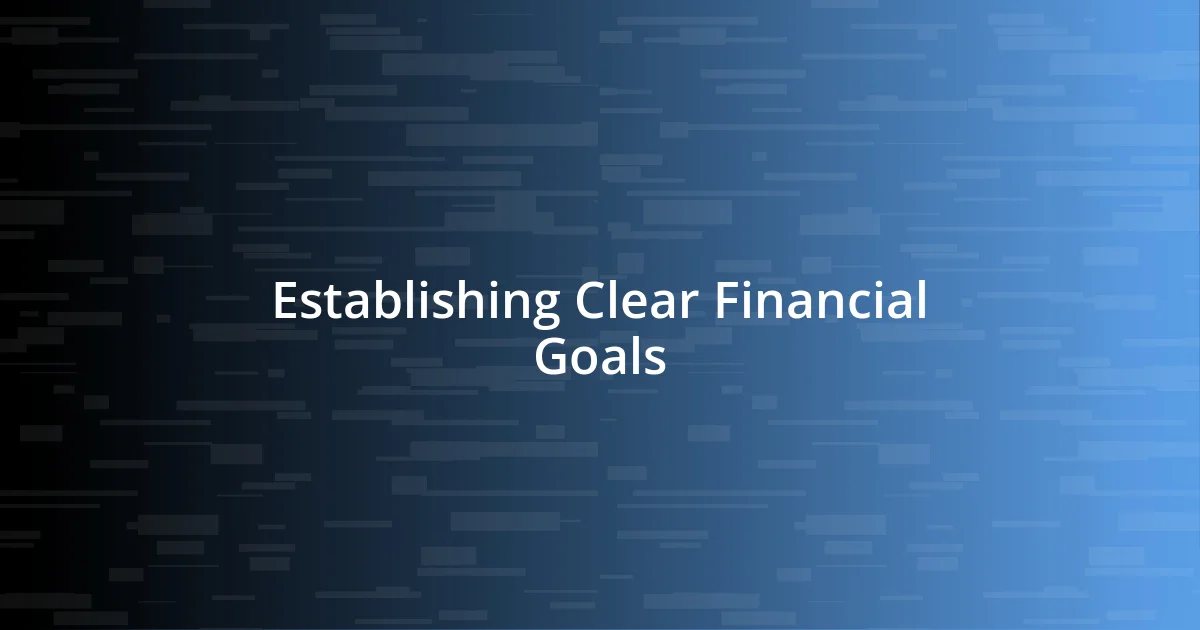
Establishing Clear Financial Goals
Setting clear financial goals has been a game changer for my budgeting journey. When I first sat down to outline my objectives, I realized I needed to be specific. For instance, instead of saying, “I want to save money,” I defined my goal: “I want to save $5,000 for a vacation within the next year.” This clarity helped me stay focused and motivated.
I recall those moments when I felt overwhelmed by all my financial responsibilities. One night, I broke down my goals into smaller, actionable steps. I created monthly targets, like saving about $420 each month, which made the larger goal seem much more achievable. Have you ever experienced that sinking feeling when looking at your total debt? Setting specific milestones turned that dread into a sense of progress, no matter how small.
Another important lesson I learned is the significance of revisiting and adjusting my goals. Life happens, and sometimes unexpected expenses arise. For example, I had to replace my car unexpectedly. But instead of losing sight of my vacation savings, I adjusted my monthly contributions to stay on track. How do you handle setbacks in your financial planning? I find that adapting keeps me grounded and committed to my goals.
| Goal Type | Description |
|---|---|
| Short-term Goals | Aim to achieve in under a year, like saving for a vacation or paying off a small debt. |
| Medium-term Goals | Targeted for one to five years, such as saving for a down payment on a home. |
| Long-term Goals | Encompass a timeframe of five years or more, like retirement savings. |
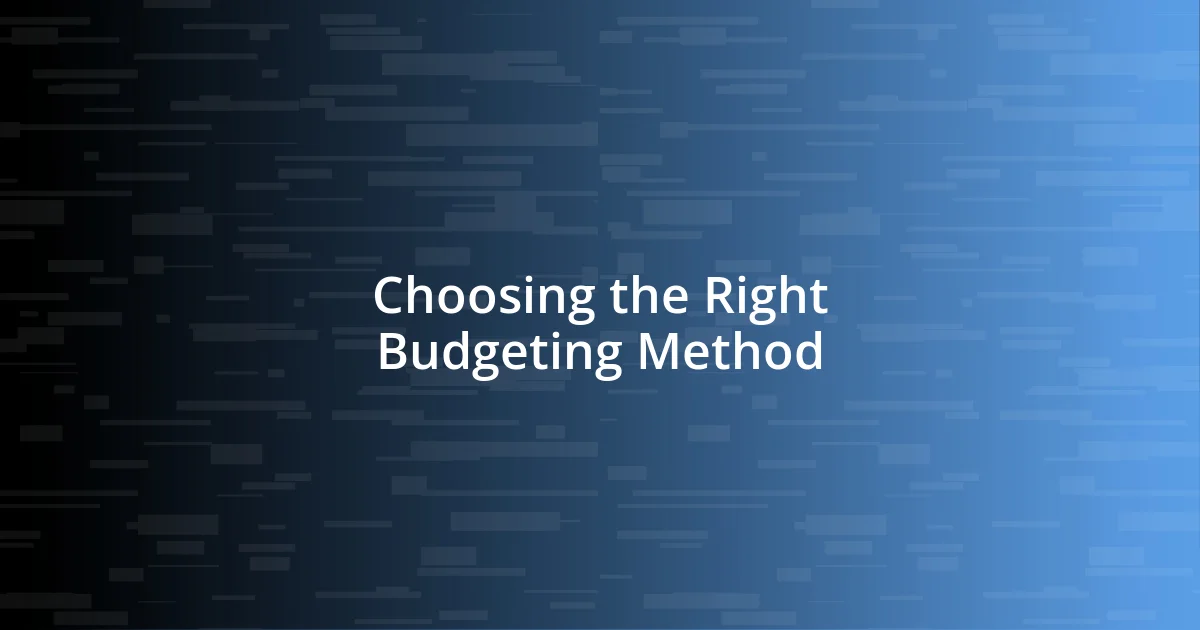
Choosing the Right Budgeting Method
Choosing the right budgeting method can feel like navigating a maze. I remember when I was unsure which approach would suit my lifestyle best. After some trial and error, I discovered that the best method is one that resonates deeply with your personal financial habits and goals. For me, adapting a combination of methods—like tying the zero-based approach with the envelope system—allowed me to visualize my spending in a way that made absolute sense.
Here are some tips to help you find your perfect budgeting fit:
- Assess Your Spending Habits: Take time to analyze where your money flows. This self-reflection can reveal patterns you never considered.
- Experiment with Different Methods: Don’t hesitate to try a couple of options over a month to see what feels right.
- Consider Your Financial Goals: Your budgeting method should align with your short-term and long-term aspirations.
- Keep It Simple: Choose a method that’s straightforward and doesn’t complicate your life further.
- Be Open to Adjustments: Life changes, and so should your budget. Don’t cling to a method that no longer serves your needs.
Finding my rhythm took patience, but letting myself explore different styles made it a fulfilling journey. How about you? Have you played around with various strategies to see what clicks?
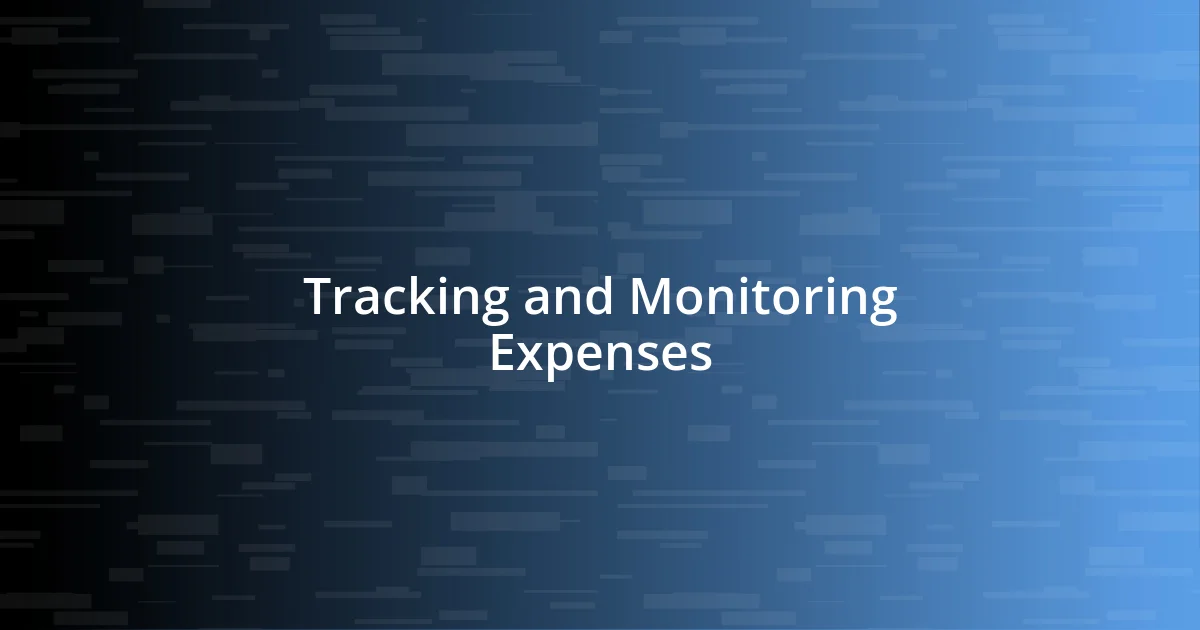
Tracking and Monitoring Expenses
Tracking and monitoring expenses has become an essential part of my budgeting routine. In the beginning, I was overwhelmed by just how many little purchases added up, often bringing my financial goals to a halt. So, I started using an expense tracker app that sends notifications anytime I spent money. This feature transformed my spending habits because it kept my finances top of mind. Have you ever had that moment of realization when you didn’t expect something to cost so much? That tool certainly helped me avoid those dread-filled surprises.
One technique I found helpful is categorizing my expenses. For instance, breaking my spending down into categories like groceries, entertainment, and utilities made it far easier to see where I could cut back. I recall one month, I decided to challenge myself by slashing my dining-out budget. I was surprised by how quickly I adapted and found joy in cooking at home. Have you ever taken on a spending challenge? It turned a tedious activity into a little adventure, allowing me to discover new recipes and save money simultaneously.
I also learned the value of a weekly review session. Each Sunday, I set aside some time to reflect on my week’s spending. It’s become a ritual that not only keeps me accountable but also shows me where I might be slipping. One week, I found I had spent a bit too much on impulse items at the grocery store. Instead of feeling guilty, I used it as an opportunity to strategize for the coming week. How do you keep track of your spending habits, and do you find it helpful? For me, it’s been a way to stay connected to my financial journey while making adjustments in real-time.
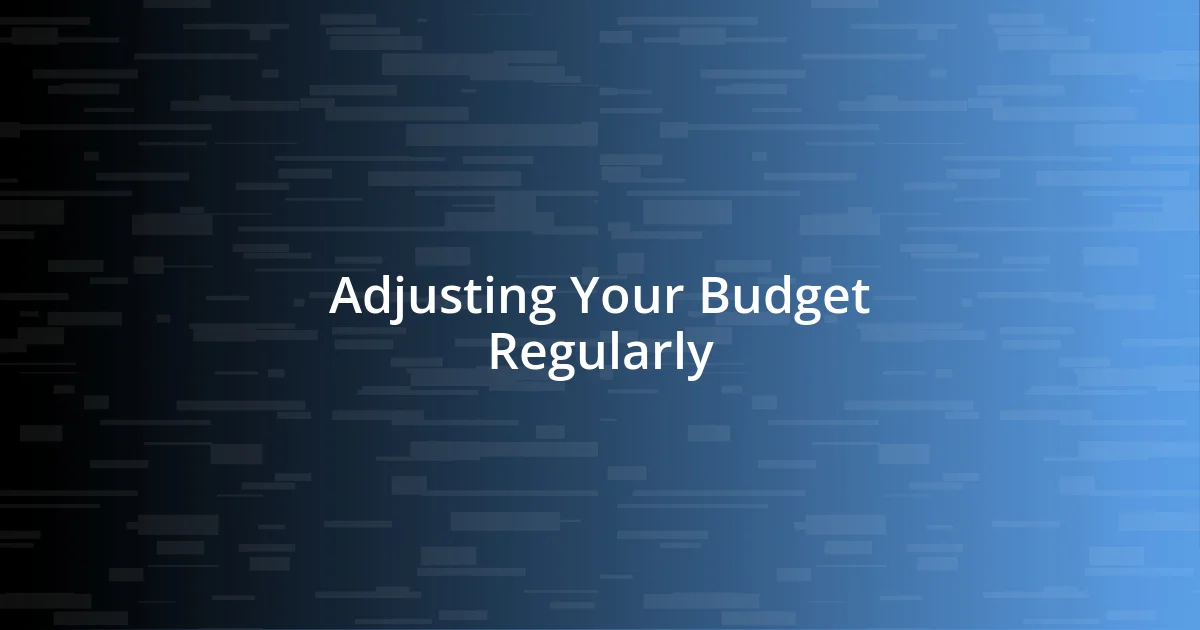
Adjusting Your Budget Regularly
Regularly adjusting my budget has been an eye-opener, and I believe it’s crucial for maintaining financial health. I learned early on that sticking rigidly to a budget can lead to frustration, especially when unexpected expenses pop up. One month, I had to replace a car tire and, rather than stress about it, I realized that adjusting my budget for the next month to accommodate this unforeseen cost made all the difference. Have you ever felt the relief of simply recalibrating your financial plan?
As life evolves, so do our priorities and expenses. I recall a time when my budgeting style wasn’t just about numbers but also about lifestyle changes. When I decided to focus more on fitness, I redirected funds from nonessential categories like entertainment to a gym membership. This shift not only felt rewarding but also taught me a valuable lesson: my budget can be a reflection of my current values. How do you ensure your budget aligns with your evolving life circumstances?
I’ve made it a practice to review my budget at least once a month. This not only gives me clarity on where my money goes but also allows me to celebrate the small wins—like saving a little extra in a week! It’s a rewarding experience to see those small victories add up, making future adjustments feel less daunting. Do you celebrate your financial milestones? For me, recognizing these moments creates a sense of accomplishment and motivates me to keep making wise financial choices.
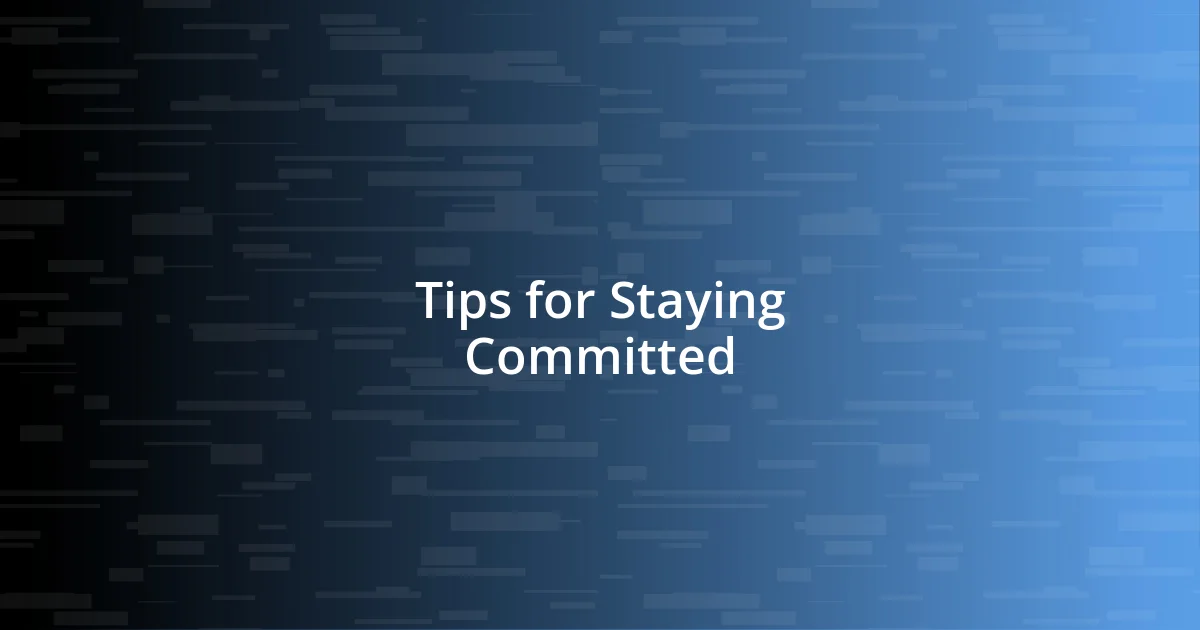
Tips for Staying Committed
Staying committed to my budgeting goals sometimes feels like running a marathon—exciting but challenging. One strategy that keeps me engaged is visualizing my financial goals. I remember the thrill of seeing my savings grow towards a vacation I had always dreamed of. By regularly reviewing my goal progress using a visual chart, I stay motivated and focused. Have you ever experienced that surge of energy from tracking something you truly care about? It’s that rush that keeps me moving forward.
Another helpful tip I’ve embraced is sharing my budgeting journey with friends or family. I once joined a budgeting group where we combined our experiences and tips. The accountability factor was a game changer. I didn’t just feel responsible for my own finances; I felt accountable to the group too. Have you found that sharing your financial goals with others boosts your commitment? I certainly have—it’s like having a cheering squad that celebrates the small victories along the way.
Lastly, I’ve incorporated rewards into my budgeting plan. It might sound a bit indulgent, but I’ve found that setting small rewards helps me stay on track. For example, after successfully sticking to my budget for a month, I treat myself to a nice dinner or a movie night. The anticipation of that reward makes the sacrifices feel worthwhile. What about you? Do you celebrate your budgeting milestones? For me, those little moments of joy provide a much-needed reminder of why I budget in the first place.
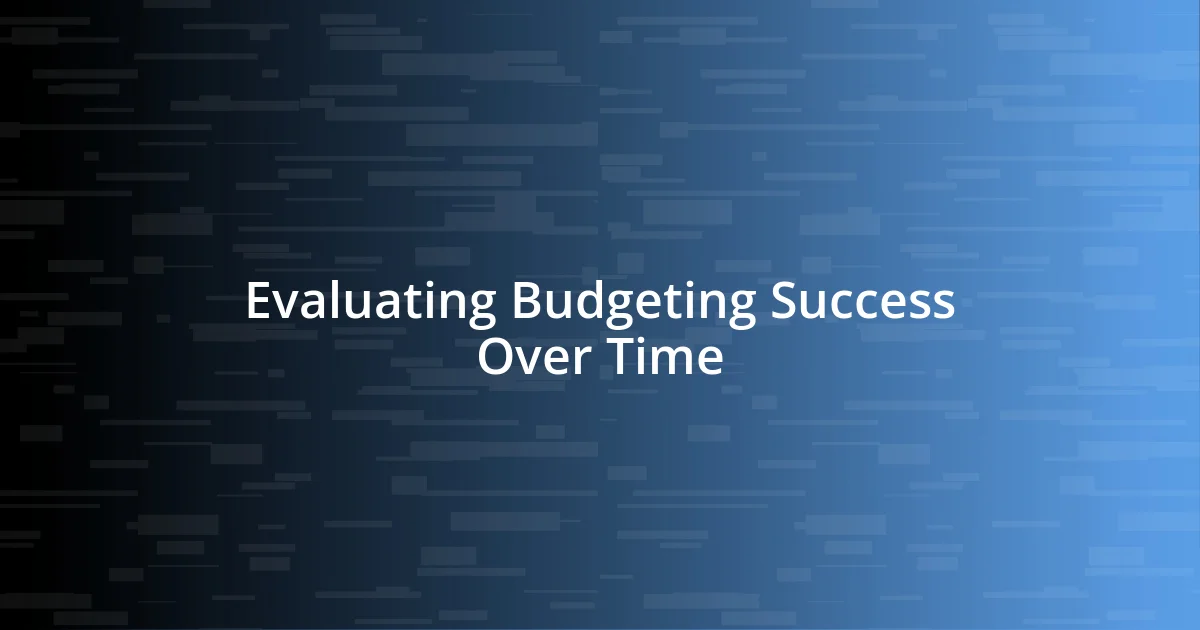
Evaluating Budgeting Success Over Time
Evaluating the success of my budgeting efforts over time has been a transformative process. I remember sitting down after six months of dedicated tracking to see how my habits evolved. It was enlightening to see not just numbers, but patterns—like the month I consistently overspent on dining out. Have you ever noticed a recurring expense that surprised you? Identifying those habits has allowed me to make intentional adjustments, leading to real savings.
I find that reflecting on my budgeting successes can boost my motivation significantly. For instance, I celebrated reaching a savings milestone by treating myself to a small getaway. The feeling of having that vacation funded purely by my budgeting efforts was incredibly satisfying. Do you ever reward yourself for financial achievements? It reinforces the idea that budgeting isn’t just about restrictions—it’s about creating opportunities.
Additionally, I’ve learned to set quarterly check-ins to assess my progress towards long-term financial goals. One quarter, I realized I was on track to pay off a credit card ahead of schedule, which ignited a sense of excitement. It’s those moments where I can tangibly feel the impact of my budgeting efforts that truly motivate me to stay the course. How often do you reflect on your financial journey? Each evaluation not only clarifies my current standing but also inspires future planning.












